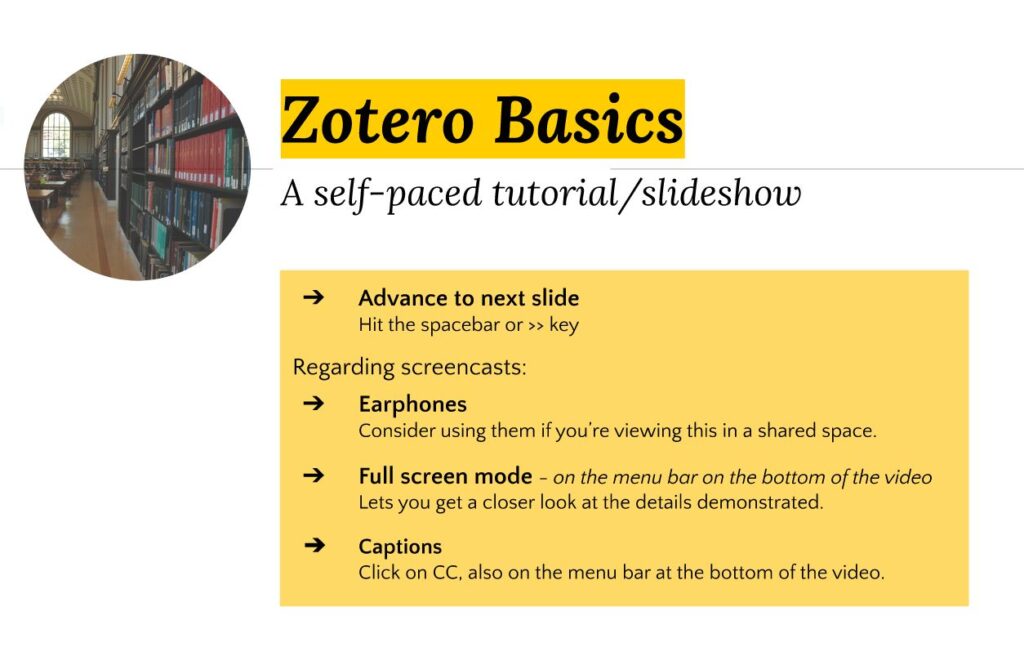Author: UC Berkeley Library
A Conversation About Awe
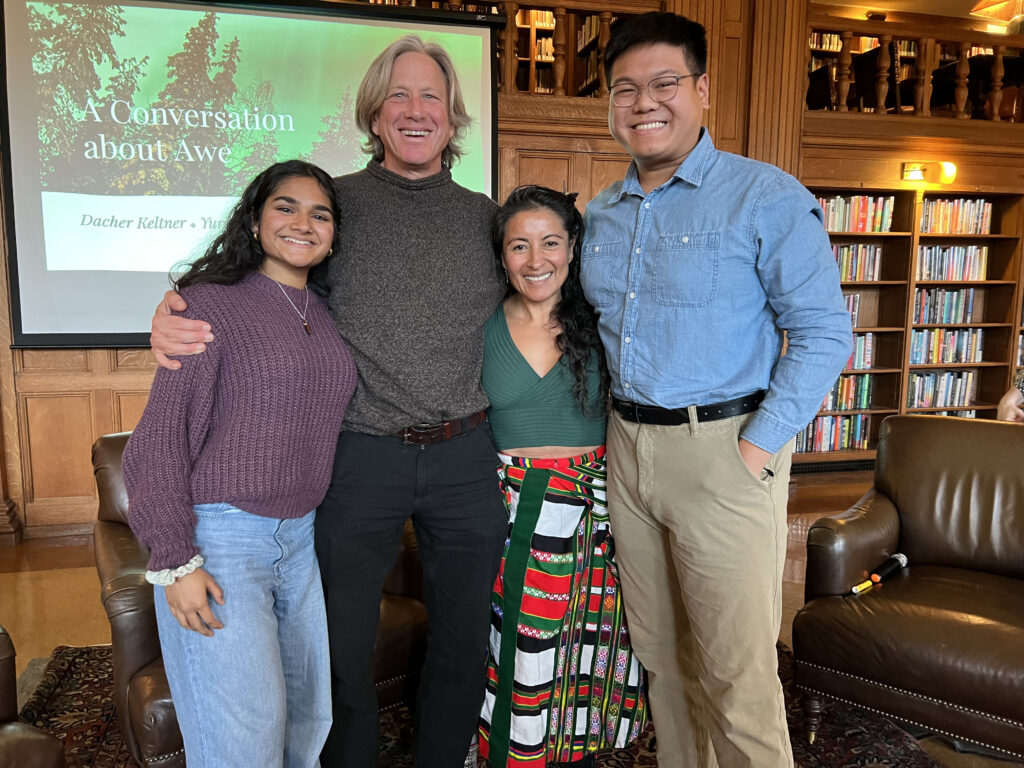
In his new book Awe: The New Science of Everyday Wonder and How it Can Transform Your Life, Dacher Keltner, UC Berkeley professor of psychology, defines awe as “the emotion we experience when we encounter vast mysteries that we don’t understand.” In his recent book talk, he introduced a receptive crowd to this concept, and how it is distinct from bliss, ecstasy, or gratitude. It is an emotion of mystery, of goosebumps. Keltner has even served as an “awe consultant,” guiding Pixar films on how to incorporate awe in the films Inside Out, and Soul.
When Prof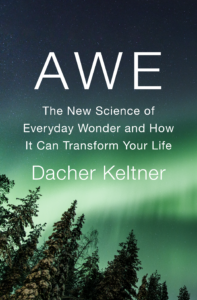 essor Keltner was joined in conversation with three colleagues and an audience of a hundred in the Morrison Library on February 27, the discussion touched on many aspects of this emotion. Yuria Celidwen, a senior fellow at the Othering & Belonging Institute, spoke about transcendent experiences as conceptualized in indigenous cultures and how the elders in her Chiapas, Mexico community teach about a sense of reverence for nature or “ecological belonging.” Wesley Lu, a fourth year undergraduate and a student mental health advocate, spoke about collective effervescence — when a life force creates a collective self whether in a classroom, during a religious ceremony or among sports fans.
essor Keltner was joined in conversation with three colleagues and an audience of a hundred in the Morrison Library on February 27, the discussion touched on many aspects of this emotion. Yuria Celidwen, a senior fellow at the Othering & Belonging Institute, spoke about transcendent experiences as conceptualized in indigenous cultures and how the elders in her Chiapas, Mexico community teach about a sense of reverence for nature or “ecological belonging.” Wesley Lu, a fourth year undergraduate and a student mental health advocate, spoke about collective effervescence — when a life force creates a collective self whether in a classroom, during a religious ceremony or among sports fans.
And no conversation about awe, especially in Berkeley, is complete without a discussion of plant medicine; third year undergraduate Mridini Vijay, also a campus mental health advocate, asked Celidwen to discuss her research on the topic that is commonly, though incorrectly, referred to as psychedelics. In Ethical Indigenous Medicine to Guide Western Psychedelic Research and Practice (The Lancet Regional Health – Americas (February 2023)), which Keltner described as “one of the most important papers on psychedelics ever published,” Celidwen and colleagues discuss concerns by Indigenous Nations over the cultural appropriation and exclusionary practices of psychedelic use in the West and the false notion that plant medicine is somehow the “one key pill to human enlightenment.” In fact, there is evidence that a daily practice incorporating “understanding, kindness, gratitude and reverence” may be as good as or better than psychedelics. In the end, there is so much more to learn about awe, and how we may experience it in our daily lives. Keltner’s book is a wonderful starting point for that journey.
Undergraduate Research Advocates Program
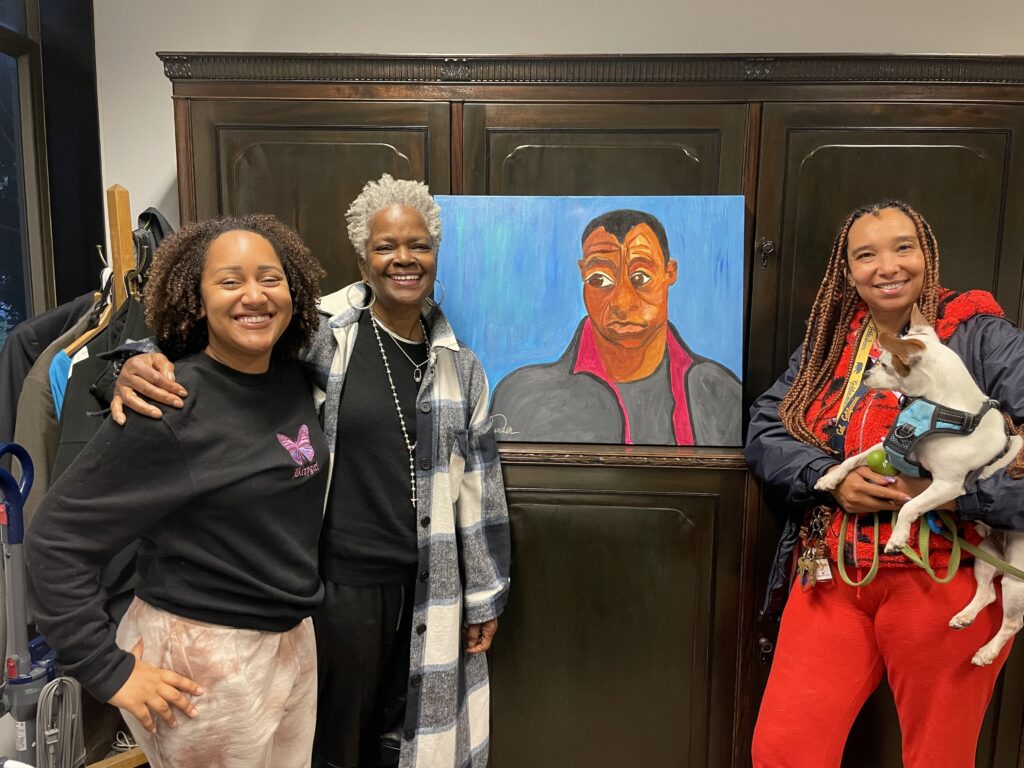
Artist Gaila Patrice Turner with her portrait of James Baldwin. With scholars Tatiana Butte and Amber Griffin-Royal.
The Social Sciences Division’s Undergraduate Research Advocates Program was initiated in spring 2022 by division head Susan Edwards and librarian David Eifler. This small pilot program worked with students from NavCal, the fellowship that assists incoming nontraditional students navigate the Berkeley campus. The pilot provided three NavCal fellows with small research stipends to explore new ways to provide library services to first generation and historically underrepresented students. It was designed to be a collaboration in which student research advocates educate librarians about ways to improve outreach; librarians, in turn, taught in-depth research methods to the students who then became trusted emissaries doing library outreach to communities to which they belong or identify.
Our first cohort — Tatiana Butte, Crystal Swan and Amber Griffin-Royal — was selected from students expressing interest in the internship and with guidance from NavCal Director Dean Tanioka. The cohort met weekly with Environmental Design Librarian David Eifler to improve their research skills and develop ways the Environmental Design Library could be more welcoming to historically underserved communities. As with any pilot, there were failures and successes – hosting a film about Oakland gentrification on a busy night failed to attract anyone. However, acquiring more welcoming art for the Library and incorporating informative posters about women and underrepresented architects and landscape architects has been successful. Perhaps most exciting was Amber and Tatiana’s presentation to NavCal students highlighting key library resources and demonstrating Zotero citation software.
The student research advocates and the librarians learned a great deal in the process: opening new lines of communication, re-exploring the role of the library and the librarian in undergraduate education, making physical improvements to the Environmental Design Library, and establishing new friendships. Perhaps most important, bonds of trust, understanding, and empathy were created that extend to today.
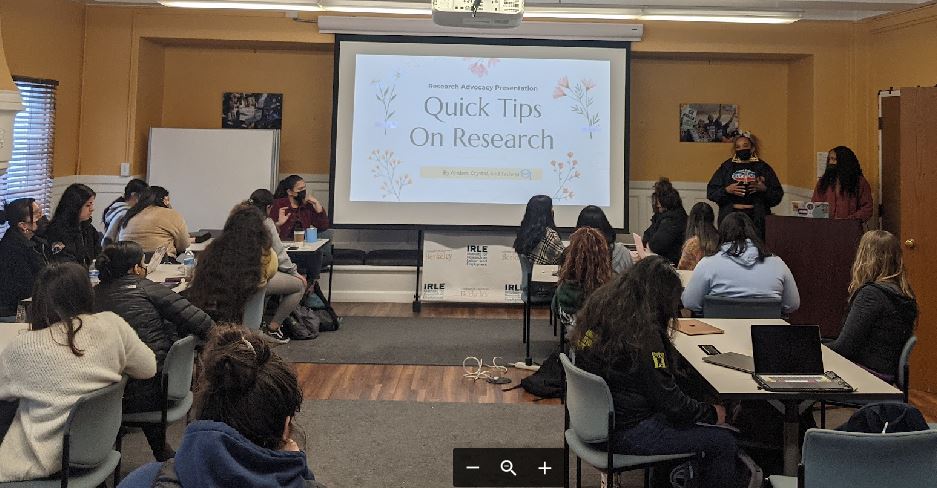
Amber Griffin-Royal and Tatiana Butte provide library instruction to NavCal cohort.
Undergraduate Library fellows offering research assistance
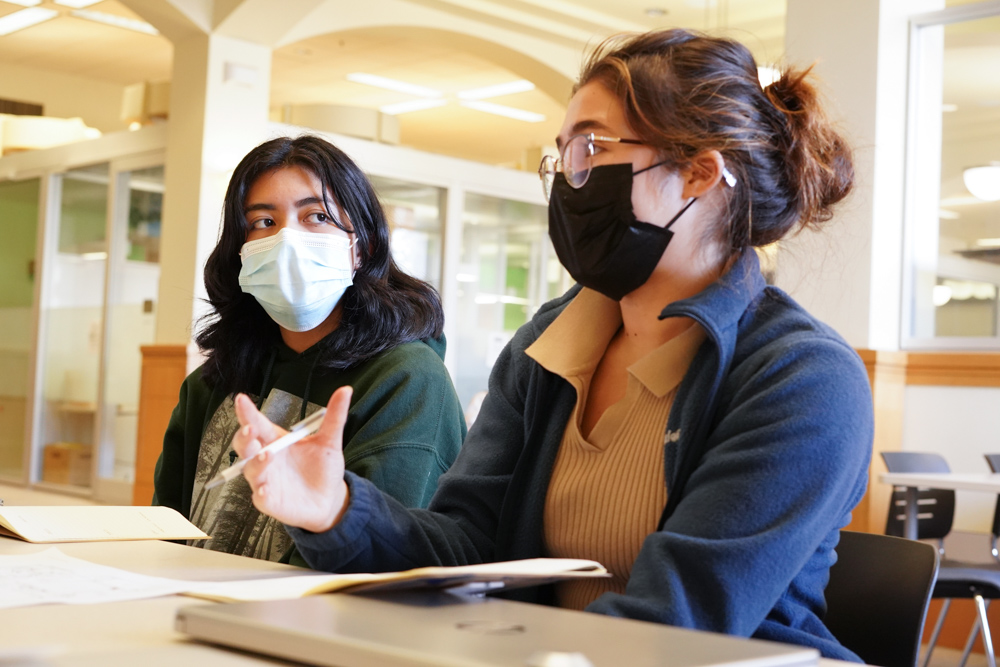
Students: Need help with your research?
Starting this month, undergraduate Library fellows are offering in-person peer library research assistance. Fellows are available 1-3 p.m. Mondays and Wednesdays through Nov. 30.
Better together: How the University of California’s libraries are uniting for a shared print future
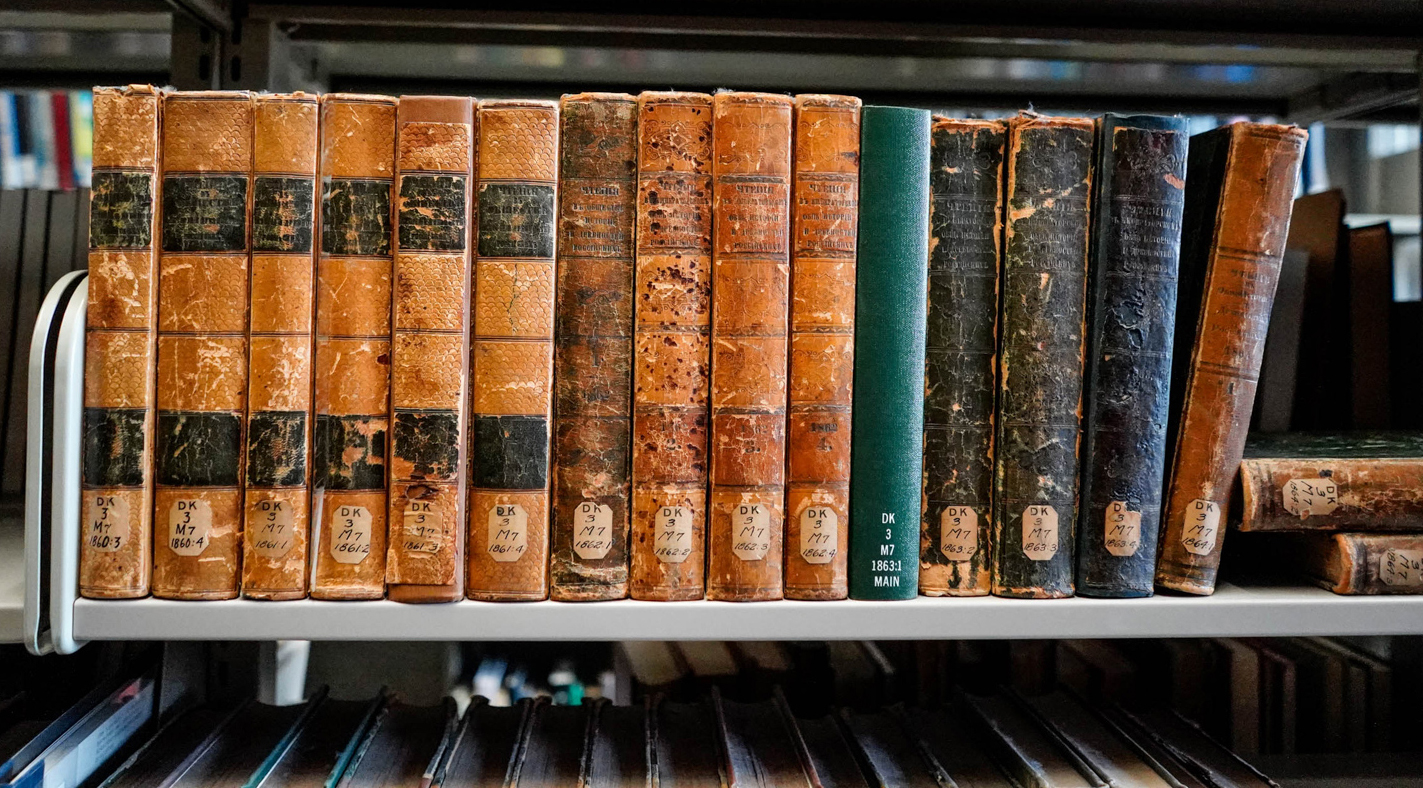
The UC Berkeley Library has recently embarked on an outreach effort to spread the word about the University of California libraries’ shared print strategies program to departments, institutes, and centers across campus.
This program is not new and has been active for a number of years. Contacts at the California Digital Library’s Shared Print Strategy Team and UC campuses have provided this information to local campus contacts as well as UC system faculty committees, including the Berkeley Division of the Academic Senate’s Committee on the Library, or LIBR; the University Committee on Library and Scholarly Communication, or UCOLASC; and the Systemwide Library and Scholarly Information Advisory Committee, or SLASIAC. The focus of the outreach is to convey that UC’s libraries are more interconnected than ever with one another, and with academic libraries across the country whose print collections augment and complement our own. This interconnectedness affords us an opportunity to redouble UC libraries’ efforts to engage in systematic and collaborative planning around print collection development and management.
The strategic goals are:
- Preserving print resources to ensure the ongoing availability and integrity of that content.
- Facilitating seamless discovery and access to content.
- Enabling the collection of and access to more and unique content.
Even though our work is largely invisible to you, the UC Berkeley Library wanted to share some basic information around the UC shared print strategy.
Please see:
In addition to preserving print resources and content for future generations, the program provides access and discovery within UC libraries’ collections as well as enables the exploration of unique content beyond our collections.
If you have questions about the UC shared print strategy, please email scholarly-resources@lists.berkeley.edu. We look forward to hearing from you and answering any questions you have as we continue to innovate around developing and providing access to print collections for current and future UC faculty and students.
Love data? Join us for Love Data Week 2022, Feb. 14-18!
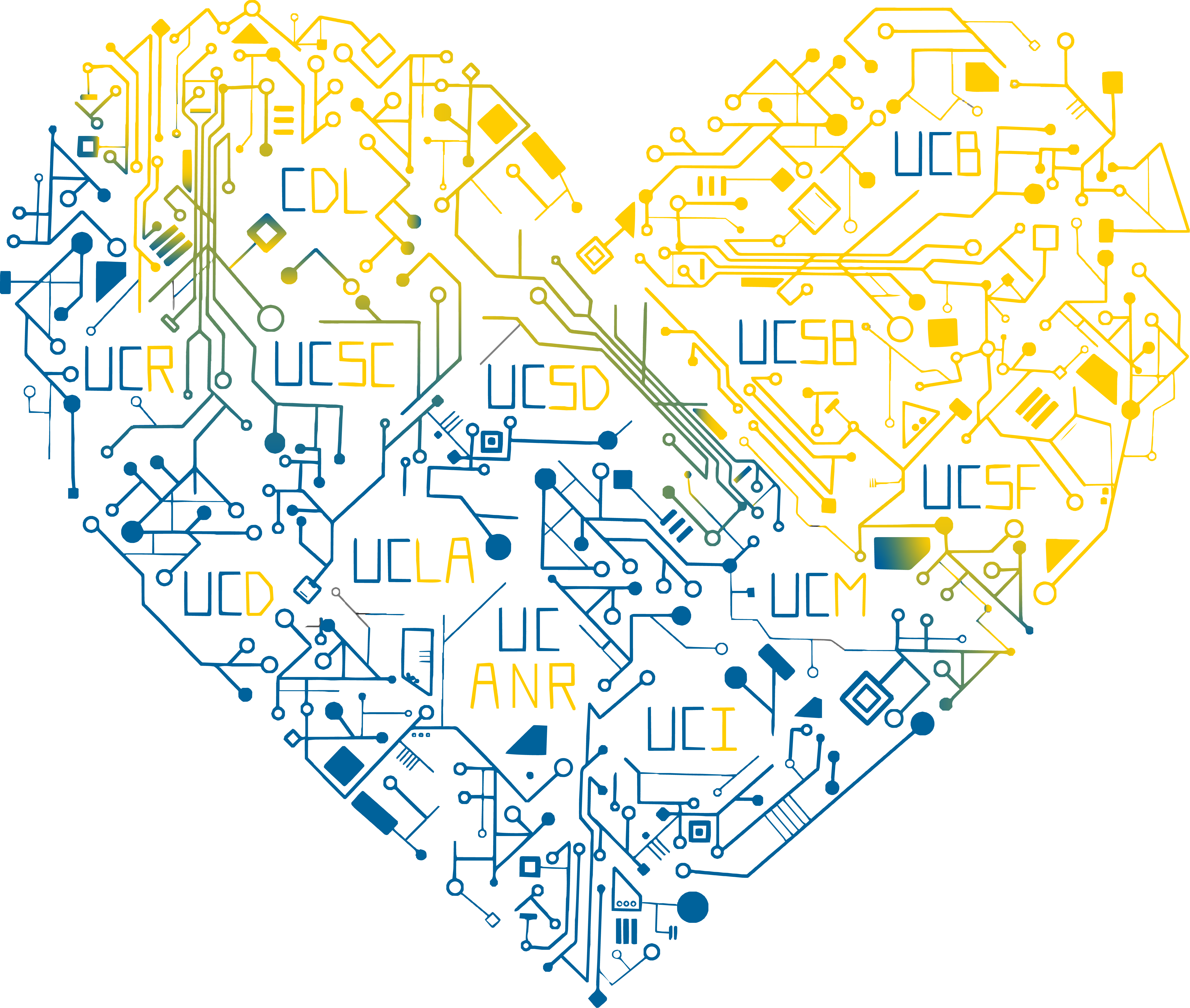
Once again, UC Libraries are collaborating on a UC-wide Love Data Week series of talks, presentations, and workshops Feb. 14-18, 2022. With over 30 presentations and workshops, there’s plenty to choose from, with topics such as:
- How to write effective data management plans
- Text analysis with Python
- How and where to share your research data
- Geospatial analysis with R and with Jupyter Notebooks
- Data ethics & justice
- Cleaning and coding data for qualitative analysis
- Software management for researchers
- An introduction to databases for newspapers and social science data
- 3-D data, visualization, and mapping
All members of the UC community are invited to attend these events to gain hands-on experience, learn about resources, and engage in discussions about data needs throughout the research process. To register for workshops during this week and see what other sessions will be offered UC-wide, visit the UC Love Data Week 2022 website.
New for Gale Digital Scholar Lab
A new interface for Gale Digital Scholar Lab is coming on December 17, 2021!
What’s different?
- New design
- Add documents to whichever Content Set you want without having to set an Active Content Set.
- Options for cleaning data more visible and user-friendly
- More flexibility for Analysis tools
- Other enhancements based on user feedback
What’s the same?
- The Build, Clean, and Analyze workflow remains the same
- Options for the six types of analyses that researchers can now run will be available
How do I try it out?
To take a tour of the enhanced Gale Digital Scholar Lab, after logging in, select the “Try Our New Experience” link in the header.
What do I need to do before the change?
- Download any existing visualizations and tabular data. There are multiple options for download, including raw analysis data (CSV and JSON) and several visualization image formats. Existing visualizations and tabular data will not be migrated automatically.
- All content sets and clean configurations will migrate to the new platform, with no action required by current researchers.
Call for comment: Pamela P. Fong Optometry and Health Sciences Library
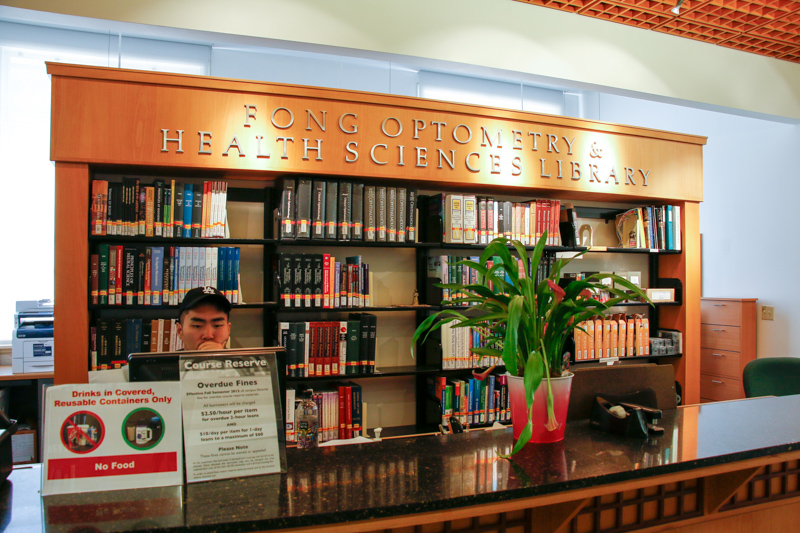
A call for comment issued this week by University Librarian Jeffrey MacKie-Mason and John Flanagan, dean of the School of Optometry, encourages all interested parties to carefully read the proposed plan for the Pamela P. Fong Optometry and Health Sciences Library at UC Berkeley and to submit comments and recommendations for consideration. All suggestions will be given consideration; most helpful are ideas that take into account the academic and scholarly needs of students and faculty at UC Berkeley and enhance the mission of the Library and the university.
The comment period is open through November 18, 2021. We invite you to submit comments via email to libraryforum@lists.berkeley.edu.
Under the proposal, the Optometry Library space will be transferred to the School of Optometry to enhance its teaching and learning space, and the Optometry Library’s services and collections will be combined with those of the Bioscience, Natural Resources & Public Health Library.
By turning the Optometry Library space permanently over to the School of Optometry, the call for comment states, the school will be able to expand its student study and meeting room spaces and provide patrons with longer hours of access. By bringing Library staff together in one location, the Library can offer optometry students, faculty, and staff better-supported operations and services.
Call for comment: South/Southeast Asia Library
Note: The UC Berkeley Library has announced its decision to withdraw the proposal for the South/Southeast Asia Library. Read more.
This week, a call for comment issued by UC Berkeley’s University Librarian Jeffrey MacKie-Mason, College of Letters & Science’s Division of Arts & Humanities Dean Anthony Cascardi, and Division of Social Sciences Dean Raka Ray encourages anyone interested to carefully read the Library’s proposed plan for the South/Southeast Asia Library at UC Berkeley and to share comments and recommendations.
The comment period is open through Friday, April 9. We invite you to submit comments via email to libraryforum@lists.berkeley.edu.
The Library has developed a proposed vision for the South/Southeast Asia Library collections and services to be integrated with the Doe Library and Main (Gardner) Stacks in 2021.
The Commission on the Future of the UC Berkeley Library report (2013) asserted that the consolidation of campus libraries “could reduce costs, increase efficiency, and improve the quality of collection development and service delivery to both students and faculty,” and encouraged the university librarian to work with academic leaders to “identify where and how space usage can be improved for user communities and service delivery better attuned to the needs of users.” In recent years the Library has closed, merged, and re-envisioned several campus libraries in response to changing user needs, emerging programs, and campus space-planning decisions.
Zotero Day – January 26 and February 1

Do you … ?
- … save random URLs in a Word or Google Doc?
- … save article PDFs on your desktop and as email attachments?
- … have a pile of article printouts sitting on your desk?
- … write down citations on sticky notes and post them to your monitor?
- … stay up late the night before a paper is due reconstructing your citations?
If you answered yes to any of the above … the answer is YES, you need Zotero (or some other citation management system).* Come to Zotero Day and learn more about this powerful tool for organizing your citations and creating bibliographies. Jennifer Dorner and David Eifler have been tag-team teaching Zotero classes which were very successful last semester, with one attracting over 150 attendees!
Spend an hour with Jennifer and David and learn to use this robust citation manager with Firefox and Chrome. These zoom workshop covers importing citations, exporting bibliographies into Word and Google Docs and sharing resources among groups. Three 1-hour sessions each day. (If you have a chance, download the program and browser connector at www.zotero.org before the workshop.)
Tuesday, January 26 (all classes are Pacific Standard Time)
- 10AM – 11AM
- Noon – 1PM
- 5PM – 6PM
Monday, February 1
- 9AM – 10AM
- 2PM – 3PM
- 4PM – 5PM
Please register to get the Zoom link – https://berkeley.libcal.com/calendar/workshops
* * * * * * * * * * * *
Can’t make it to these workshops? Try a self-paced tutorial? This tutorial includes 24 slides and 18 embedded screencasts (totalling approximately 18 minutes of viewing). Do the tutorial at your own pace and skip or fast-forward through the screencasts. In total, the tutorial can take anywhere from 15 minutes to an hour. Check it out at: Zotero Basics
* * * * * * * * * * * *
* adapted from Why use a citation management tool?, Gallagher Law Library, University of Washington.
COVID Chronicles: ICYMI edition
International Newspaper Display at Moffitt Library
It started with a tweet, back in July, by Berkeley City Councilmember Rigel Robinson (UCB 2018) describing the international newspaper display outside of Moffitt Library.
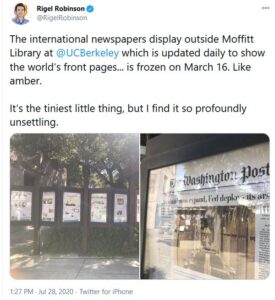
Robinson’s tweet got picked up by Berkeleyside, the online news source for all things Berkeley. The Berkeleyside story provided background on the international newspaper display in the plaza outside Moffitt Library and the Free Speech Movement Cafe and spoke with our Social Sciences Division colleague, Glenn Gillespie, Reference/Government Information Specialist.
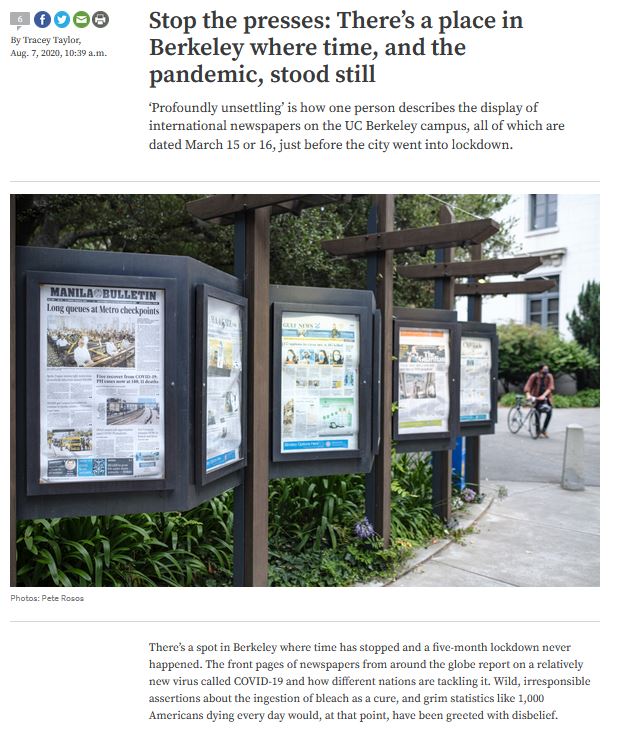
Just to play up the whole time warp/time capsule theme, it has been four months since this story appeared. And, at the time, it had been five months since the newspapers had been updated. Where exactly did 2020 go? Has it been the longest year on record? Or the shortest?
